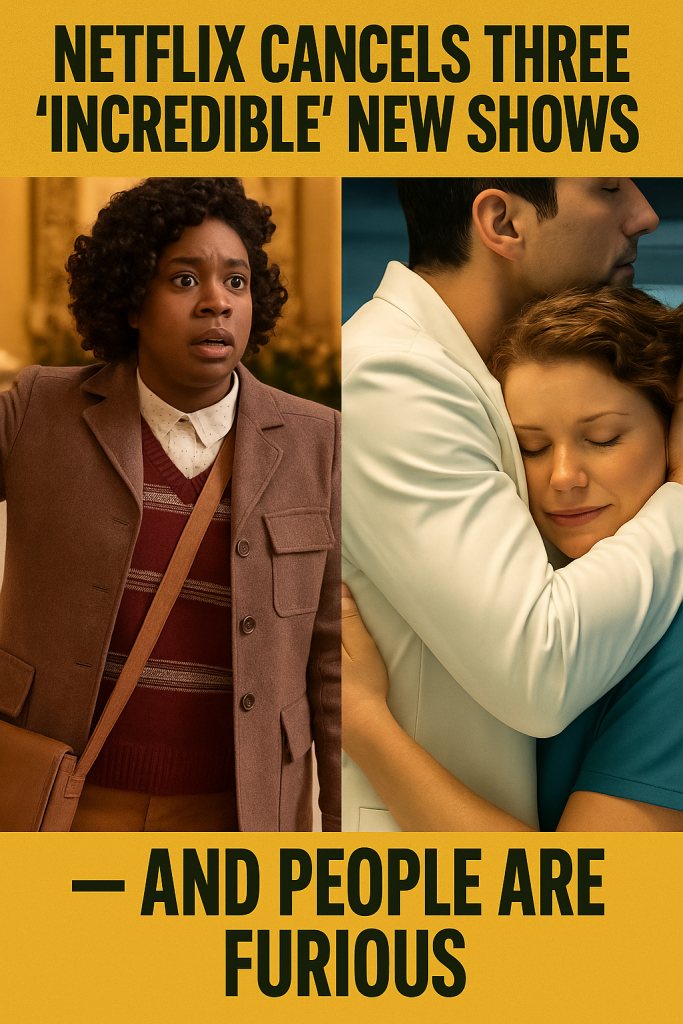Netflix has once again ignited a firestorm of criticism after announcing the cancellation of three highly praised new shows, leaving fans frustrated and demanding answers. The unexpected axing of these “incredible” series, each with dedicated followings and strong critical reception, has triggered a wave of backlash across social media platforms, reigniting ongoing debates about the streaming giant’s programming strategy.
The three shows, launched in late 2023 and early 2024, quickly gained momentum for their unique storytelling, diverse casts, and bold creative visions. One series, a genre-blending drama combining mystery and supernatural elements, was widely noted for its gripping plot and cinematic quality. Another, a critically acclaimed dark comedy, won viewers over with its sharp writing and memorable characters. The third, a documentary-style series exploring underrepresented cultural histories, earned praise for its insightful and respectful portrayal of complex topics.
Despite their positive reception and apparent potential, Netflix announced the cancellation of all three after just one season. This development shocked audiences and industry commentators alike, especially given streaming platforms’ traditional willingness to nurture emerging hits over multiple seasons. The news quickly sparked a groundswell of disappointment and anger, with many fans taking to Twitter, Instagram, and TikTok to voice their outrage.
Why the sudden cancellations? Sources close to the matter suggest that Netflix’s decision was driven by a mix of underwhelming viewership numbers relative to the company’s high benchmarks, and a strategic pivot focusing on returning franchises and big-budget productions. Netflix reportedly aims to maximize subscriber retention by betting on proven hits rather than riskier new ventures—even those with passionate niche audiences.
The cancellations have fueled ongoing controversy about Netflix’s commitment to creative risk-taking and diversity in programming. Many viewers feel that quirky, innovative, or culturally significant shows are disproportionately vulnerable to cancellation, which could stifle fresh voices in the entertainment landscape. Social media hashtags highlighting these canceled shows have been trending, as fans share petitions and calls for other networks or streaming services to pick up the projects.
“It’s heartbreaking to see such fantastic and boundary-pushing content cut short,” wrote one fan in a widely shared post. “These shows mattered—they weren’t just entertainment but representation and storytelling that challenged the norms.”
Industry observers note that Netflix’s decision underscores the increasing pressures facing streaming platforms to remain financially viable amid growing competition. As more services enter the market, the cost of producing original content has skyrocketed, prompting companies to make tough calls about which series to continue funding.
However, this particular round of cancellations stands out because of the enthusiastic critical and fan support the shows had garnered so swiftly. For many in the audience, the abrupt endings feel like a loss not only of entertainment but also of creative diversity and innovation.
Netflix has not provided detailed public explanations beyond general statements about content strategy and viewership metrics. The company continues to release new content regularly, but among fans and creators, there is an unmistakable sense of frustration regarding how quickly promising narratives can be halted.
As the debate unfolds, viewers are calling on Netflix and other platforms to reconsider how they balance commercial imperatives with artistic ambition. In an era when audiences crave originality and representation more than ever, the fate of these canceled shows serves as a potent reminder of the challenges facing the future of streaming entertainment.



